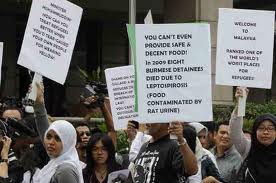 Lawyers for Liberty applauds yesterday’s visionary decisiveness by the High Court of Australia –a quality severely lacking within the Malaysian context.
Lawyers for Liberty applauds yesterday’s visionary decisiveness by the High Court of Australia –a quality severely lacking within the Malaysian context.Briefly the facts of the challenge are that section 198A(3) of the Australian Migration Act enables the Minister to declare that a specified country is a safe third country for asylum seekers to be transferred to. The safety of that country is to be assessed by four criteria one of which being that, that country meets relevant human rights standards in providing protection. The plaintiffs contended, among other things that the declaration made on 25 July 2011 was not validly made because the four criteria set out in s 198A(3)(i)-(iv) are facts which did not exist.
The Minister had relied, not on cogent evidence of Malaysia’s commitment to protection but rather among other reasons on an “understanding” from his conversations with the Malaysian Minister of Home Affairs and other Malaysian officials that the Malaysian Government “was keen to improve its treatment of refugees and asylum seekers” and that Malaysia was “actively considering” allowing work rights for all asylum seekers.
The Court, in holding that the Minister’s declaration was invalid, stated that whether the relevant “access” and “protection” are provided and “human rights standards” are met, are questions which cannot be answered without reference to the domestic laws of the specified country, including its Constitution and statute laws, and the international legal obligations to which it has bound itself.
The Court said that “it remains the case that Malaysia does not have laws which recognise and protect refugees from refoulement and persecution. The arrangement with Malaysia is no more than a statement of the participants’ intentions and political commitments. It creates no obligation for the purposes of international law” and “although it attempted to address some of the problems which face asylum-seekers in Malaysia , it could not alter the present state of affairs”
Lawyers for Liberty is heartened that the Court’s decision underscores the most significant aspects of civil society’s campaign against the refugee-swap deal and also that the decision highlights the inadequacy of the UNHCR endorsed “pseudo-protection” being extended to asylum seekers in Malaysia . Ratification of the Refugee 1951 Convention and 1967 Protocol should have been the primary consideration preceding any negotiations.
Short of that, amendments to Malaysia ’s immigration act – not a temporary exemption- should have been a condition preceding the arrangement.
Lawyers for Liberty urges the Malaysian government to consider and act in a manner consistent with its international reputation as a member of the Human Rights Council in all future actions involving the combating of transnational organized crime.
RENUKA T BALA

